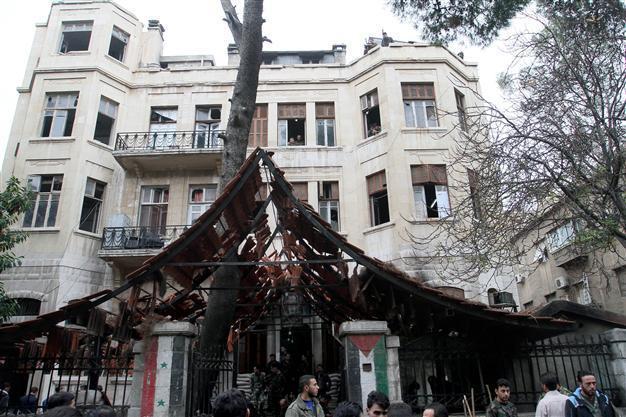Damascus blast kills four as rebels take Christian town
DAMASCUS - Agence France-Presse

People walk amid damage at the site of a suicide bombing in the Jisr Abyad neighborhood in Damascus, Syria on Tuesday, Dec. 3, 2013. AP Photo
A suicide bombing in central Damascus killed four people on Tuesday, hours after jihadists and other rebels seized a historic Christian town north of the Syrian capital.State television said the suicide attack in the Jisr al-Abyad neighbourhood killed four people and wounded 17, and the Syrian Observatory for Human Rights said it appeared to have targeted a government building.
The explosion shattered the entrance of the army administrative building used to assist the families of government soldiers killed in combat.
The ground was littered with rubble and broken glass, and pools of blood could be seen on the road in front of the building.
North of the capital, rebels exchanged fire with government troops outside Maalula, a day after opposition forces captured the Christian hamlet in the strategic Qalamoun region.
The town is renowned as a symbol of the long Christian presence in Syria, and many of its 5,000 residents still speak the ancient language Aramaic, which Jesus Christ is believed to have spoken.
"There are some exchanges of fire with army forces outside the town, but there is no major fighting and the opposition controls Maalula," said Observatory director Rami Abdel Rahman.
Rebel forces, including the jihadist Al-Nusra Front, swept into Maalula from the surrounding hills after rolling explosive-laden tyres onto regime troops below.
Most of Maalula's residents fled in September, when rebel forces first entered the town before the Syrian army pushed them back to its outskirts.
On Tuesday, religious officials told AFP 12 nuns were taken from a convent in Maalula to the nearby rebel stronghold of Yabrud.
It was not immediately clear whether the nuns had been kidnapped or merely evacuated for their own safety.
Meanwhile, a military source told pro-regime daily Al-Watan that regime reinforcements were headed to Maalula to "cleanse it of terrorists".
The rebel capture of Maalula comes amid a regime advance elsewhere in the surrounding region of
Qalamoun, where government troops have taken the towns of Qara and Deir Attiyeh.
They have also seized 60 percent of the biggest town in the region, Nabuk, and the Observatory said fierce clashes raged there on Tuesday, with two men and a woman killed by regime shelling.
Nearly 126,000 people have been killed in the Syrian conflict, according to the Observatory, and the UN human rights chief said Monday there was evidence of both war crimes and crimes against humanity in the conflict.
"The evidence indicates responsibility at the highest level of government, including the head of state," said rights chief Navi Pillay.
It was the first time evidence by a UN-mandated commission has directly implicated President Bashar al-Assad in crimes committed during the conflict that erupted in 2011.
The four-member investigative team, which has been probing rights violations since shortly after fighting broke out, has accused both the regime and the rebels of war crimes.
For the first time, however, they have now produced a long and confidential list of suspected perpetrators.
Pillay said the names would remain sealed until they could be provided to a "credible" investigation, and reiterated her call for the case to be handed over to the International Criminal Court in The Hague to ensure accountability.
With the onset of winter, aid agencies have warned of the danger posed to some 2.2 million UN-registered Syrian refugees in neighbouring countries.
UN humanitarian chief Valerie Amos urged the United Nations Security Council to press Syria to allow greater access to trapped civilians, diplomats said.
"The brutality of this conflict is unacceptable. Even war has rules. In this conflict, the rules are not being respected," Amos was quoted as telling a closed meeting.
"Holding civilians hostage to the conflict is not acceptable. The government must be convinced to allow humanitarian access," she added.
With the onset of winter, aid agencies have warned of the danger posed to Syrian refugees, especially children, in neighbouring countries.
The UN children's fund UNICEF said the situation is especially precarious in Lebanon, where thousands of families are living in informal tent settlements on flood-prone land.
"Millions of displaced Syrian children have had to find safety under what are, frankly, inadequate living conditions," said Maria Calivis, UNICEF head for the region.
















